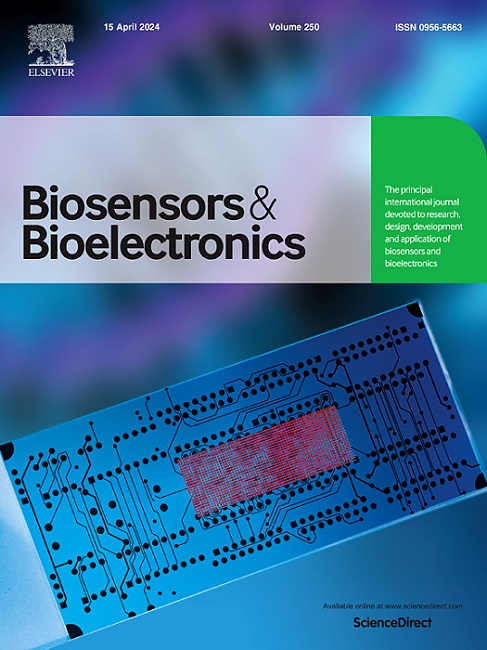Ultrasensitive magnetic nanomechanical biosensors for simultaneous detection of multiple cardiovascular disease biomarkers in a single blood drop
IF 10.7
1区 生物学
Q1 BIOPHYSICS
引用次数: 0
Abstract
Cardiovascular disease (CVD) is the number one cause of death, and the early prevention of CVD is considered the most useful and cost-effective intervention strategy, highlighting the critical need for frequent and long-term monitoring cardiac abnormalities. However, traditional blood test methods often require considerable volumes of blood (>10 mL), which could burden physical health, especially for individuals in poor health. Here, we report a novel magnetic nanomechanical sensor (MNS) capable of simultaneously detecting multiple CVD biomarkers (brain natriuretic peptide (BNP), cardiac troponin I (cTnI) and creatine kinase MB (CK-MB)) in a single drop of blood (<1 μL). Relying on the force-sensitive microcantilevers and robust magnetic force, MNS can directly detect blood samples with a detection sensitivity for BNP as low as 0.1 pg/mL. Moreover, we improved the MNS sensitivity by reducing nonspecific adsorption and focusing the force on specific locations on the sensor surface. The effectiveness of the MNS was demonstrated through the detection of samples from clinical CVD patients and healthy individuals. Given its ultrasensitive, trace-sample requirement, and ability to monitor multiple biomarkers, the MNS holds significant potential for frequent and long-term monitoring—not only for CVD but also for the prevention and management of other chronic diseases.
超灵敏的磁性纳米机械生物传感器,用于同时检测单滴血中的多种心血管疾病生物标志物
心血管疾病(CVD)是死亡的头号原因,早期预防CVD被认为是最有用和最具成本效益的干预策略,强调了频繁和长期监测心脏异常的迫切需要。然而,传统的血液检测方法通常需要大量的血液(10毫升),这可能会给身体健康带来负担,尤其是对健康状况不佳的人。在这里,我们报道了一种新型磁性纳米机械传感器(MNS),它能够同时检测单滴血(1 μL)中的多种CVD生物标志物(脑钠肽(BNP),心肌肌钙蛋白I (cTnI)和肌酸激酶MB (CK-MB))。依靠力敏感的微悬臂梁和强大的磁力,MNS可以直接检测血液样本,对BNP的检测灵敏度低至0.1 pg/mL。此外,我们通过减少非特异性吸附和将力聚焦在传感器表面的特定位置来提高MNS的灵敏度。通过检测临床CVD患者和健康个体的样本,证明了MNS的有效性。鉴于其超灵敏、痕量样品要求和监测多种生物标志物的能力,MNS具有频繁和长期监测的巨大潜力,不仅用于心血管疾病,还用于其他慢性疾病的预防和管理。
本文章由计算机程序翻译,如有差异,请以英文原文为准。
求助全文
约1分钟内获得全文
求助全文
来源期刊

Biosensors and Bioelectronics
工程技术-电化学
CiteScore
20.80
自引率
7.10%
发文量
1006
审稿时长
29 days
期刊介绍:
Biosensors & Bioelectronics, along with its open access companion journal Biosensors & Bioelectronics: X, is the leading international publication in the field of biosensors and bioelectronics. It covers research, design, development, and application of biosensors, which are analytical devices incorporating biological materials with physicochemical transducers. These devices, including sensors, DNA chips, electronic noses, and lab-on-a-chip, produce digital signals proportional to specific analytes. Examples include immunosensors and enzyme-based biosensors, applied in various fields such as medicine, environmental monitoring, and food industry. The journal also focuses on molecular and supramolecular structures for enhancing device performance.
 求助内容:
求助内容: 应助结果提醒方式:
应助结果提醒方式:


